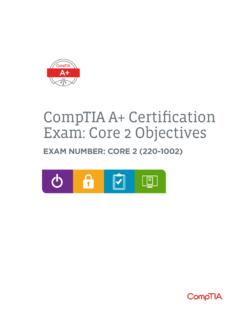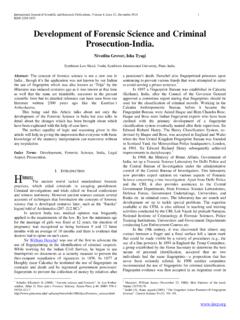Transcription of National Physical Therapy Examination® (NPTE®) Candidate ...
1 Version 1 National Physical Therapy Examination (NPTE ) Candidate Handbook For the Physical Therapist (PT) and Physical Therapist Assistant (PTA) Exams Promoting Safety and CompetenceVersion 2 Contents About the Federation of State Boards of Physical Therapy (FSBPT ) .. 4 Purpose of the NPTE Program .. 4 Exam Development .. 4 Section 2: Exam Integrity and Security .. 5 Protect your Reputation and Career .. 5 Exam Security on Test Day .. 6 Exam Security after Test Day .. 6 NPTE Security Agreement, General Terms of Use, and Arbitration Policy .. 6 Additional Security Information .. 7 Section 3: Eligibility Requirements .. 7 General Eligibility Requirements .. 7 Testing Limits.
2 7 Section 4: Understanding the NPTE .. 7 Exam Administration .. 7 Exam Overview .. 8 Exam Scoring .. 8 Section 5: Preparing for the NPTE .. 9 Content Outline .. 9 Practice Exam and Assessment Tool .. 9 Section 6: Exam Registration and Scheduling .. 9 Your Journey Map .. 9 FSBPT Account Creation .. 10 Validating Graduation (CAPTE-Accredited Programs Only) .. 10 Registering for the NPTE .. 10 Exam Eligibility .. 10 Testing Accommodations .. 11 Authorization to Test (ATT) Letter .. 11 Scheduling your Exam .. 11 Section 7: Rescheduling, Withdrawing, and No-Shows .. 12 Rescheduling a Prometric Appointment .. 12 Canceling a Prometric Appointment .. 12 Version 3 No-Shows .. 13 Section 8: Test Day.
3 13 Arrival and Check-In .. 13 Testing Center Environment .. 14 Exam Navigation .. 14 Note-Taking .. 14 Breaks .. 15 Disruptions to Testing .. 15 Section 9: After Test Day .. 15 Receiving Your Results .. 15 Withheld Scores .. 16 Completing the Licensure Process .. 16 Score 16 Need to Test Again? .. 16 Performance Feedback Report .. 17 Section 10: Appeal Policy .. 17 Candidate Appeals .. 17 Jurisdiction Appeals .. 17 Contact Us .. 17 NPTE-PT Test Content Outline .. 20 NPTE-PTA Test Content Outline .. 21 Abbreviations .. 22 Sample Questions .. 24 Physical Therapist Examination .. 24 Physical Therapist Assistant Examination .. 25 Section 1: General Information Version 4 About the Federation of State Boards of Physical Therapy (FSBPT ) The mission of FSBPT is to protect the public by providing service and leadership that promote safe and competent Physical Therapy practice.
4 FSBPT s vision is that state licensing boards and FSBPT will achieve a high level of public protection based upon a strong foundation of laws and regulatory standards in Physical Therapy , effective tools and systems to assess entry-level and continuing competence, and public and professional awareness of resources for public protection. FSBPT develops, maintains, and administers the National Physical Therapy Examination (NPTE ) for Physical therapists (PTs) and Physical therapist assistants (PTAs). Purpose of the NPTE Program The PT and PTA exams are designed to assess a Candidate s basic entry-level competence after graduation from a PT or PTA program accredited by the Commission on Accreditation in Physical Therapy Education (CAPTE) or from an equivalent non-accredited program.
5 The exams have two main purposes: 1. To help ensure that only those individuals who have the requisite knowledge of Physical Therapy are licensed in the Physical Therapy field 2. To help regulatory authorities evaluate candidates and provide standards that are comparable from jurisdiction to jurisdiction The National exams are only one part of the evaluation process used by licensing authorities. In some jurisdictions, the National exam is supplemented by other means of assessing candidates' ability to practice Physical Therapy . For more information on each jurisdiction s licensure requirements, see the Licensing Authorities Contact Information page on FSBPT s website. Exam Development Questions (also known as items) appearing on the NPTE are developed by volunteer item writers.
6 These volunteers are PTs and PTAs who represent a broad range of practice settings from across the country. Item writers attend workshops and receive instruction to enable them to write high-quality, job-related examination items. Once items have been developed and submitted to FSBPT, the Exam Development Committee (EDC) reviews the items and determines if the item is entry-level, tests current content, and contains only one correct answer. The EDC also reviews entire test forms to ensure each item does not overlap content or cue the answer for other items on the examination form. These items will later become pre-test questions on exams to determine fairness before appearing on the NPTE as actual scored items.
7 There are fifty pretest items on each level of examination. Examinations are built based on an examination outline or blueprint. This outline identifies the content areas that must be on the examination and the number of questions to be included from each content Version 5 area. The outline is developed from a job analysis, which identifies the activities and tasks that comprise the entry-level practice of Physical Therapy . The job analysis is based on survey data and expert judgments. The involvement of a representative group of practicing Physical therapists, Physical therapist assistants, and other professionals during examination development ensures that the examinations are relevant to the current practice of Physical Therapy .
8 Additionally, staff and technical advisors work to maintain the examinations and ensure compliance with established testing standards. Section 2: Exam Integrity and Security Protect your Reputation and Career Passing the NPTE is a big step toward receiving your license to practice Physical Therapy . Understandably, you want to take advantage of all available resources when preparing for this important examination. In the past, when you prepared for examinations in school, you may have considered fellow students to be good resources for learning about questions that were on those tests. This should not be the case when preparing for the NPTE. The NPTE is the property of FSBPT and is protected by contract, trade secret, and federal copyright laws.
9 It is a violation of these laws, and thus illegal, to share any information whatsoever about any NPTE question. In particular, sharing information about a question recalled from memory or asking someone who has taken the NPTE to share such information is illegal. Soliciting recalled questions from candidates who have previously taken the exam is deeply unethical for several reasons. The first is obvious: you are expected to pass the test based on your own merit and without assistance. The members of the public who will entrust you with their well-being expect that you are a trustworthy and competent individual. By asking previous test takers to share questions with you, you are committing an illegal act and are undermining the very purpose of the exam.
10 Also, by soliciting questions from previous test takers, you are encouraging others to commit illegal acts. FSBPT aggressively protects the integrity of the NPTE. This protection is important to safeguarding the public from persons who do not have the requisite knowledge of Physical Therapy and therefore are not qualified to practice Physical Therapy . Any person for whom FSBPT has a reasonable suspicion of sharing or soliciting information about any NPTE question may be prohibited from sitting for the NPTE until a full investigation has determined that the person did not share or solicit such information. FSBPT has prosecuted and will continue to prosecute individuals who share or solicit others to share any information whatsoever about any NPTE question.











